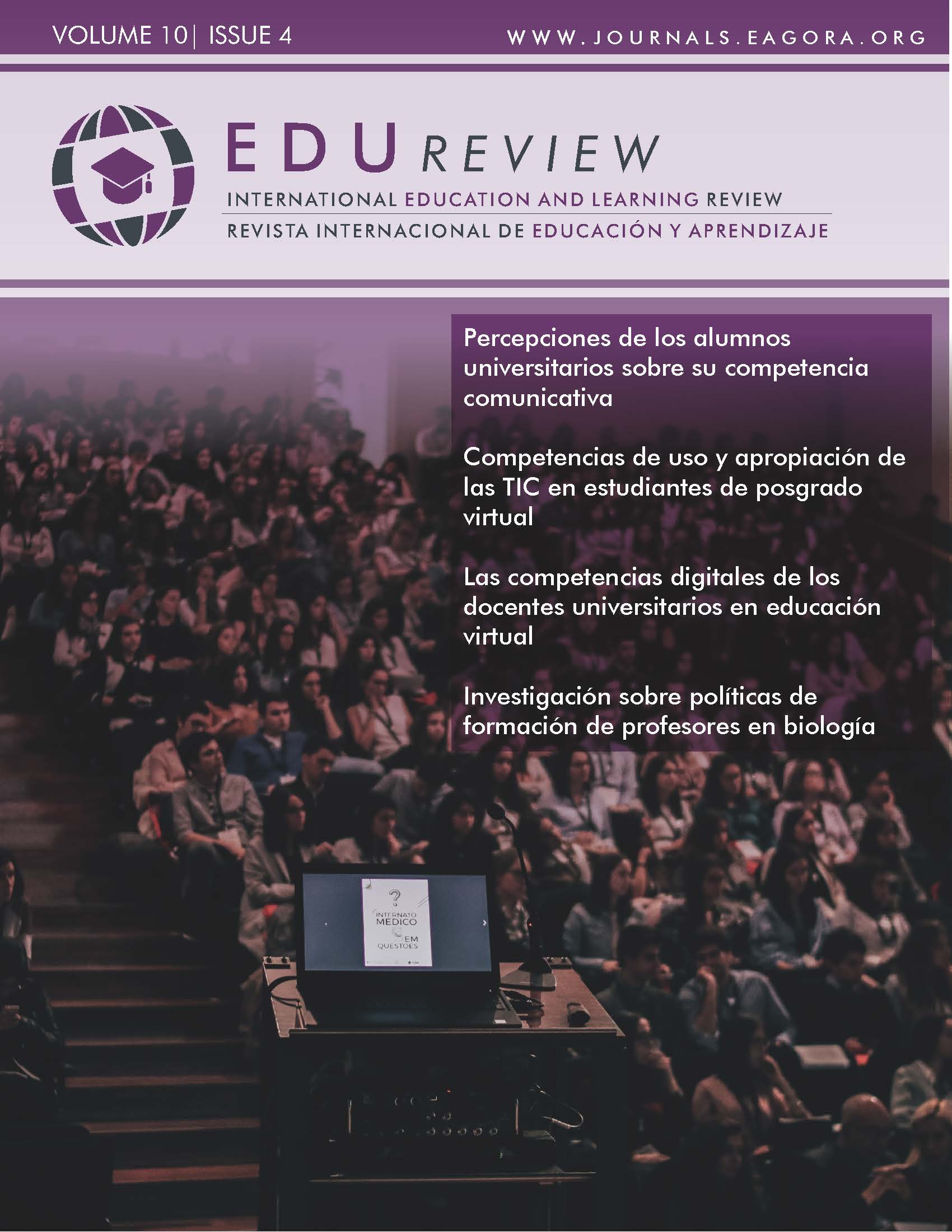Interdisciplinary Teams: the Best Option for the Problem-Solving Method
DOI:
https://doi.org/10.37467/gkarevedu.v10.3205Keywords:
Challenge-based learning, Problem-solving , Interdisciplinary teams, Collaborative workingAbstract
This article shows a didactic sequence carried out in the course Estructuras Simbólicas en la Imagen, la Literatura y la Música, in which students solve a challenge about current needs. To organize the interdisciplinary teams, a poll was applied. As a result, students with different competencies were formed in teams. To determine if this practice was successful, we applied a poll with the aim of gathering students’ opinions. Most of the students expressed the benefits of working in interdisciplinary teams since they were able to develop creative Open Educational Resources.
Downloads
Global Statistics ℹ️
|
606
Views
|
274
Downloads
|
|
880
Total
|
|
References
Bradley-Levine, J. y Mosier. G. (2016). Students’ Perceptions of Projects Based Learning within New Teach School Model. International Journal of Educational Reform, 25(1), 1-15. https://doi.org/10.1177%2F105678791602500101 DOI: https://doi.org/10.1177/105678791602500101
Bustos, H. Y. (2018). El desarrollo del Pensamiento Crítico en la Educación Superior utilizando como estrategia innovadora el Aprendizaje Basado en Proyectos. EIEI ACOFI. 1-11. https://acofipapers.org/index.php/eiei/article/view/466
Díaz Barriga, Á. (2006). El enfoque de las competencias en la educación. ¿una alternativa o un disfraz de cambio. En Perfiles Educativos, XXVIII(111), 7-36. https://bit.ly/3yWWz55
Delgado, R. del P., Rojo, M., Torres, J. G. y Becerril, H. (2018). Aprendizaje Basado en Retos. Revista Electrónica Anfei, 9. https://bit.ly/3OX8Lbt
Fidalgo, A., Sein-Echalauce, M. L. y García, F. J. (2017). Aprendizaje Basado en Retos en una Asignatura Académica Universitaria. Revista Iberoamericana de Informática Educativa, 25, 1-8. https://bit.ly/3nYiiD2
López, L. (2012). La importancia de la interdisciplinariedad en la construcción del conocimiento desde la filosofía de la educación. Sophia, Colección de Filosofía de la Educación, 13, 367-377. https://www.redalyc.org/pdf/4418/441846102017.pdf
López, L. (2016). Formación del pensamiento crítico en estudiantes: retos y perspectivas de vinculación con el entono. Revista del departamento de formación y actualización académica. Año 7. Número 15. Pp. 23-26. Recuperado de: https://revistas.uaa.mx/index.php/docere/article/view/1561/1452 DOI: https://doi.org/10.33064/2016docere151561
Medina-Nicolalde, M. (2017). El aprendizaje basado en proyectos una oportunidad para trabajar interdisciplinariamente. Revista de la Facultad de Cultura Física de la Universidad de Granma, 14(46), 236-246. https://dialnet.unirioja.es/servlet/articulo?codigo=6220162
Revelo-Sánchez, O. Collazos-Ordoñez, C. y Jiménez-Toledo, J. (2018) El trabajo colaborativo como estrategia didáctica para la enseñanza/aprendizaje de la programación: una revisión sistemática de literatura. Tecnológicas, 21(41), 115-134. https://bit.ly/2WbI5J9 DOI: https://doi.org/10.22430/22565337.731
Roselli, N. (2016). El aprendizaje colaborativo: Bases teóricas y estrategias aplicables en la enseñanza universitaria. Propósitos y Representaciones, 4(1), 219-280. https://bit.ly/2Z2z71W DOI: https://doi.org/10.20511/pyr2016.v4n1.90
Toledo Morales, P. y Sánchez García, J. M. (2018). Aprendizaje basado en proyectos: una experiencia universitaria. Profesorado: Revista de currículum y formación del profesorado, 22(2), 429-449. https://idus.us.es/handle/11441/86870 DOI: https://doi.org/10.30827/profesorado.v22i2.7733
Villasana, N. y Dorrego, E. (2007). Habilidades Sociales en entornos virtuales de trabajo colaborativo. Revista Iberoamericana de Educación a Distancia, 10(2), 45-74. DOI: https://doi.org/10.5944/ried.2.10.993
Downloads
Published
How to Cite
Issue
Section
License
Those authors who publish in this journal accept the following terms:
-
Authors retain copyright.
-
Authors transfer to the journal the right of first publication. The journal also owns the publishing rights.
-
All published contents are governed by an Attribution-NoDerivatives 4.0 International License.
Access the informative version and legal text of the license. By virtue of this, third parties are allowed to use what is published as long as they mention the authorship of the work and the first publication in this journal. If you transform the material, you may not distribute the modified work. -
Authors may make other independent and additional contractual arrangements for non-exclusive distribution of the version of the article published in this journal (e.g., inclusion in an institutional repository or publication in a book) as long as they clearly indicate that the work was first published in this journal.
- Authors are allowed and recommended to publish their work on the Internet (for example on institutional and personal websites), following the publication of, and referencing the journal, as this could lead to constructive exchanges and a more extensive and quick circulation of published works (see The Effect of Open Access).













